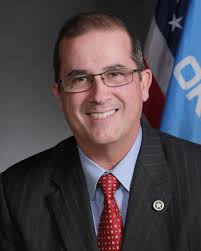
Gann Cites Former Commissioner Bob Anthony’s Opinions
Rep. Tom Gann, the Republican legislator from Inola who is challenging Oklahoma Corporation Commission rate hike decisions before the State Supreme Court, this week reached back to opinions offered by a former regulator to challenge PSO’s $1.2 billion in energy improvement projects.
Gann, in filings on Monday in PSO’s rate case, presented previous comments and filed opinions of former Oklahoma Corporation Commissioner Bob Anthony who also fought votes by Commissioner Todd Hiett and contended Hiett’s support of rate increases to cover 2021 storm costs for utilities was not constitutional.
Gann led the filings with the headline, “Opinion of Commissioner Bob Anthony.” It quoted Anthony at length and noted Anthony originally made the filing December 16, 2024.
“I believe these cases are suffering from some of the same deficiencies I have called to this Commission’s attention in the past. However, they may be ultimately determined after my term
in office expires. Therefore, because I do not have time to write new opinions for all these cases, tailoring my previous arguments to the specifics of these individual matters, I hereby attached for
the benefit of both the parties and future decision makers some of my earlier filings.”
Anthony’s Prior Filings Resurface in New PSO Rate Challenge
A footnote offered by Rep. Gann also offered the explanation that he used Anthony’s original opinions in the filing and it wasn’t Anthony who made the November 17 filings.
He further noted in his footnote he also made similar challenging filings in 9 previous Corporation Commission cases, then stated, “Now additionally filed by Gann in OCC Cases PUD 2025-000040/42/52/58/62/64/72.”
The current PSO rate case is PUD-000064.
Background on Gann’s Previous OCC Case Filings
The previous filings by Gann involved PUD 2025-00011/21/22/24/27/28/29/30/31 cases. Gann also included a list of several opinions offered by Anthony in which he said Commissioner Todd Hiett should resign from the commission over incidents involving drunkenness and what Anthony labeled as a conflict of interest. Gann made similar such challenges before the Supreme Court in filings in which he is fighting a one-page audit of billions of dollars in securitization bonds used by utilities following Winter Storm 2021 Uri. The utilities were allowed by the Corporation Commission, on 2-1 votes with Anthony in opposition, to saddle winter fuel costs onto ratepayers for up to 25 years or longer.

When questioned initially whether he made the filings, Anthony explained it was Rep. Gann but he still defended the opinions made before he left office.
“I stand by all of the opinions especially the dissenting opinions I made as a Commissioner. I’m not retracting anything.”
PSO’s $1.2 Billion Generation Portfolio Request
What Rep. Gann is fighting in the latest matter involves Public Service Company’s request for preapproval costs and cost approval of eight generation resources totaling $1.2 billion in costs. PSO filed the request in September and in recent days filed summaries of testimony of company executives and managers in support of the projects.

Matthew A. Horeled, Vice President, regulatory and Finance for PSO, offered testimony in which he said the utility was “requesting approval of eight generation resources to meet customer needs.” He pointed to a recent Letter of Agreement signed by PSO “with a new customer” that will eventually result in a load of over 1,000 MW. Horeled said the company’s previous largest single customer was 130 MW and the firm has 11 customers under Letters of Agreement or contracts that are 50 MW or larger.
The eight generation resources consist of three wind resources, three Battery Energy Storage System (BESS) resources, and two natural gas resources. Seven of the projects involve up to 1,500 Megawatts of Southwest Power Pool accredited capacity.


